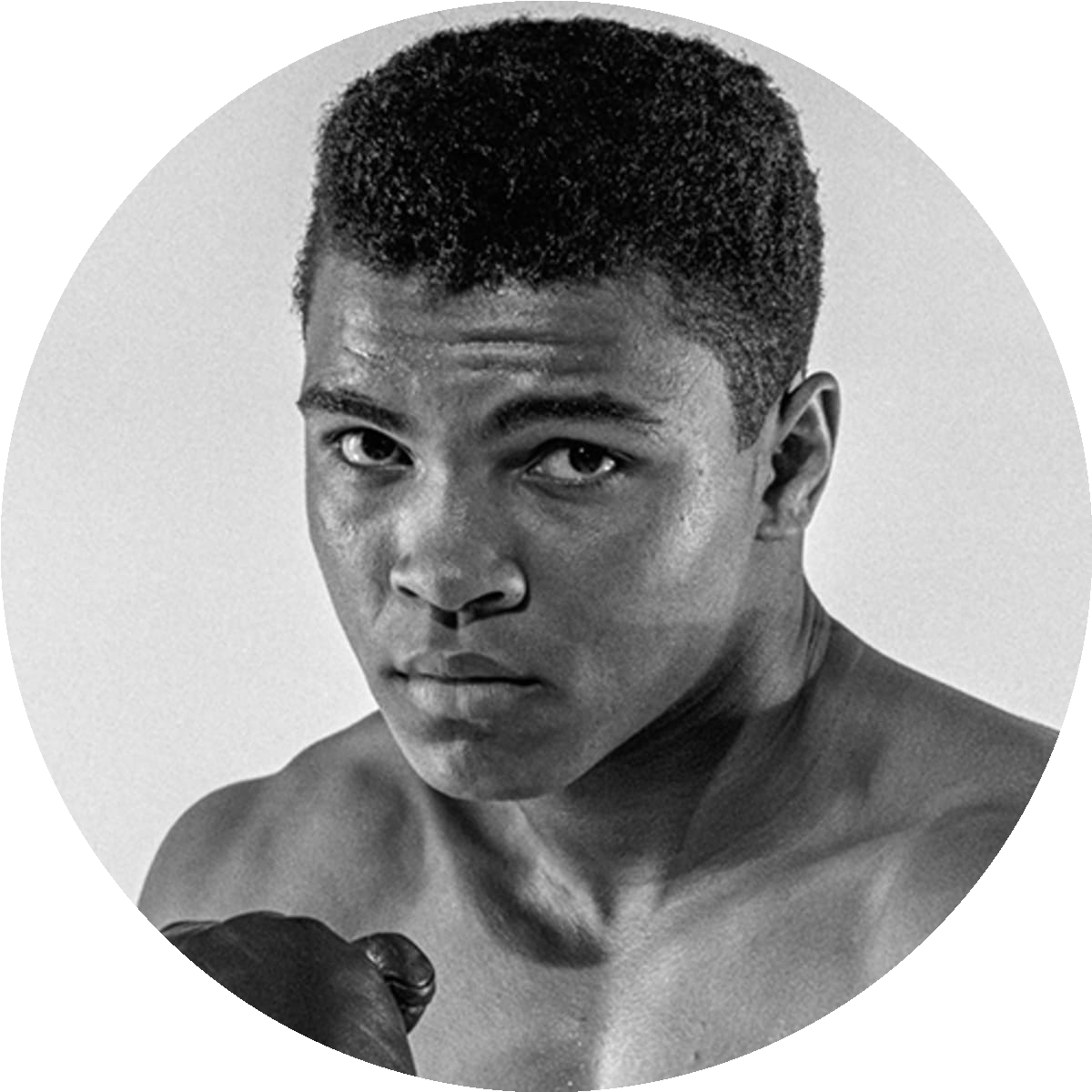
Muhammad Ali
Muhammad Ali (born Cassius Marcellus Clay Jr. January 17, 1942 – June 3, 2016) was an American professional boxer, activist, entertainer, poet and philanthropist.

Muhammad Ali
Muhammad Ali (born Cassius Marcellus Clay Jr. January 17, 1942 – June 3, 2016) was an American professional boxer, activist, entertainer, poet and philanthropist.
He was named after his father, Cassius Marcellus Clay Sr., who had a sister and four brothers
and who himself was named in honor of the 19th-century Republican politician and staunch abolitionist
Cassius Marcellus Clay, also from the state of Kentucky. Clay's father's paternal grandparents were John
Clay and Sallie Anne Clay; Clay's sister Eva claimed that Sallie was a native of Madagascar. He was
a descendant of slaves of the antebellum South, and was predominantly of African descent, with some
Irish and English family heritage. Ali's maternal great-grandfather, Abe Grady, emigrated
from Ennis, Co. Clare, Ireland. DNA testing performed in 2018 showed that, through his paternal
grandmother, Ali was a descendant of the former slave Archer Alexander, who had been chosen from the
building crew as the model of a freed man for the Emancipation Memorial, and was the subject of
abolitionist William Greenleaf Eliot's book, The Story of Archer Alexander: From Slavery to Freedom.
Like Ali, Alexander fought for his freedom.
His father was a sign and billboard painter, and his mother, Odessa O'Grady Clay (1917–1994), was a
domestic helper. Although Cassius Sr. was a Methodist, he allowed Odessa to bring up both Cassius Jr.
and his younger brother, Rudolph "Rudy" Clay (later renamed Rahman Ali), as Baptists. Cassius Jr.
attended Central High School in Louisville. He was dyslexic, which led to difficulties in reading and
writing, at school and for much of his life. Ali grew up amid racial segregation. His mother
recalled one occasion when he was denied a drink of water at a store—"They wouldn't give him one because
of his color. That really affected him." He was also strongly affected by the 1955 murder of Emmett
Till, which led to young Clay and a friend taking out their frustration by vandalizing a local rail
yard. His daughter Hana later wrote that Ali once told her, "Nothing would ever shake me up (more) than
the story of Emmett Till."
Ali was first directed toward boxing by Louisville police officer and boxing coach Joe E. Martin,
who encountered the 12-year-old fuming over a thief's having taken his bicycle. He told the officer he
was going to "whup" the thief. The officer told Clay he had better learn how to box first.
Initially, Clay did not take up Martin's offer, but after seeing amateur boxers on a local television
boxing program called Tomorrow's Champions, Clay was interested in the prospect of fighting. He then
began to work with trainer Fred Stoner, whom he credits with giving him the "real training", eventually
molding "my style, my stamina and my system." For the last four years of Clay's amateur career he was
trained by boxing cutman Chuck Bodak.
Clay made his amateur boxing debut in 1954 against local amateur boxer Ronnie O'Keefe. He won by split
decision. He went on to win six Kentucky Golden Gloves titles, two national Golden Gloves titles, an
Amateur Athletic Union national title, and the light heavyweight gold medal in the 1960 Summer Olympics
in Rome. Clay's amateur record was 100 wins with five losses. Ali said in his 1975 autobiography
that shortly after his return from the Rome Olympics, he threw his gold medal into the Ohio River after
he and a friend were refused service at a "whites-only" restaurant and fought with a white gang. The
story was later disputed, and several of Ali's friends, including Bundini Brown and photographer Howard
Bingham, denied it. Brown told Sports Illustrated writer Mark Kram, "Honkies sure bought into that one!"
Thomas Hauser's biography of Ali stated that Ali was refused service at the diner but that he lost his
medal a year after he won it. Ali received a replacement medal at a basketball intermission during
the 1996 Olympics in Atlanta, where he lit the torch to start the games.
| Date | Broadcast | Region(s) | Viewers |
|---|---|---|---|
| June 9, 2016 | Muhammad Ali memorial service | Worldwide | 1,000,000,000 |
| January 4, 2007 | Michael Parkinson's Greatest Entertainers | United Kingdom | 3,630,000 |
| September 21, 2001 | America: A Tribute to Heroes | United States | 60,000,000 |
| July 19, 1996 | Atlanta 1996 Summer Olympics opening ceremony | Worldwide | 3,500,000,000 |
| July 19, 1996 | Atlanta 1996 Summer Olympics opening ceremony | United States | 209,000,000 |
| January 17, 1981 | Parkinson (series 10, episode 32) | United Kingdom | 12,000,000 |
| October 24, 1979 | Diff'rent Strokes ("Arnold's Hero") | United States | 41,000,000 |
| December 25, 1978 | This Is Your Life ("Muhammad Ali") | United States | 60,000,000 |
| March 28, 1977 | 49th Academy Awards | United States | 39,719,000 |
| December 7, 1974 | Parkinson | United Kingdom | 12,000,000 |
| January 25, 1974 | Parkinson (series 3, episode 18) | United Kingdom | 12,000,000 |
| October 17, 1971 | Parkinson (series 1, episode 14) | United Kingdom | 12,000,000 |